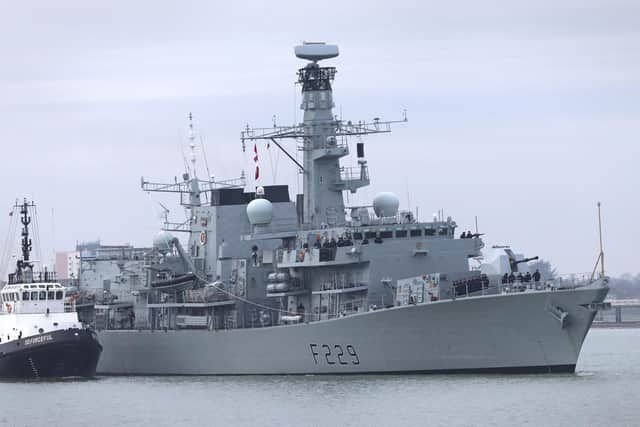Royal Navy: Iran slams claim of Portsmouth-based frigate seizing anti-tank missiles as 'fake news'
and live on Freeview channel 276
The action in the Gulf of Oman comes after other seizures by French and US forces in the region as Western powers increase their pressure on Iran as it enriches uranium closer to weapons-grade levels. The raid took place on February 23 after an American aircraft detected a small motorboat with cargo covered by a grey tarpaulin heading from Iran.
A helicopter from the Portsmouth-based Royal Navy frigate HMS Lancaster chased the vessel as it ignored being hailed by radio, the Ministry of Defence said. The boat tried to re-enter Iranian territorial water but was stopped before it could.
Advertisement
Hide AdAdvertisement
Hide Ad

Also on board were small fins that the US Navy identified as jet vanes for medium-range ballistic missiles as well as devices the navy identified as ‘impact sensor covers’ that go on the tips of those missiles.
While the MoD did not identify where it suspected the weapons would go, the US Navy described the seizure as happening ‘along a route historically used to traffic weapons unlawfully to Yemen’.
However, Iran has now rejected the seizure as ‘fake news’ by the Royal Navy. ‘The countries which are the biggest exporters of weapons and equipment to critical areas of the world are trying to mislead world public opinion by making false claims and promoting fake news,’ Iranian Foreign Ministry spokesperson, Nasser Kanaani, said in a statement carried by state media, according to news agency Reuters.
Advertisement
Hide AdAdvertisement
Hide AdREAD NOW: Great navy memories
Iranian components have helped build a missile arsenal for Yemen’s Houthi rebels, who have held the country’s capital, Sanaa, since 2014.
A United Nations resolution bans arms transfers to Houthi rebels. Tehran has denied arming the rebels despite physical evidence, numerous seizures and experts tying the weapons back to Iran.
‘This seizure by HMS Lancaster and the permanent presence of the Royal Navy in the Gulf region supports our commitment to uphold international law and tackle activity that threatens peace and security around the world,’ UK Defence Secretary Ben Wallace said.
HMS Lancaster is a Duke-class Type 23 frigate of the Royal Navy, launched by Queen Elizabeth II in 1990 and is known as ‘The Queen's Frigate’. She sailed for the Gulf in August last year and was expected to remain deployed until 2025 with her crew being rotated every four months.
Advertisement
Hide AdAdvertisement
Hide AdThe war in Yemen has deteriorated largely into a stalemate and spawned one of the world’s worst humanitarian crises. However, Saudi-led air strikes have not been recorded in Yemen since the kingdom began a ceasefire at the end of March 2022, according to the Yemen Data Project.
That ceasefire expired in October despite diplomatic efforts to renew it. That has led to fears the war could again escalate. More than 150,000 people have been killed in Yemen during the fighting, including over 14,500 civilians.